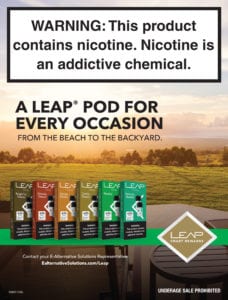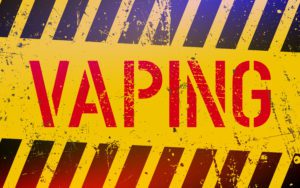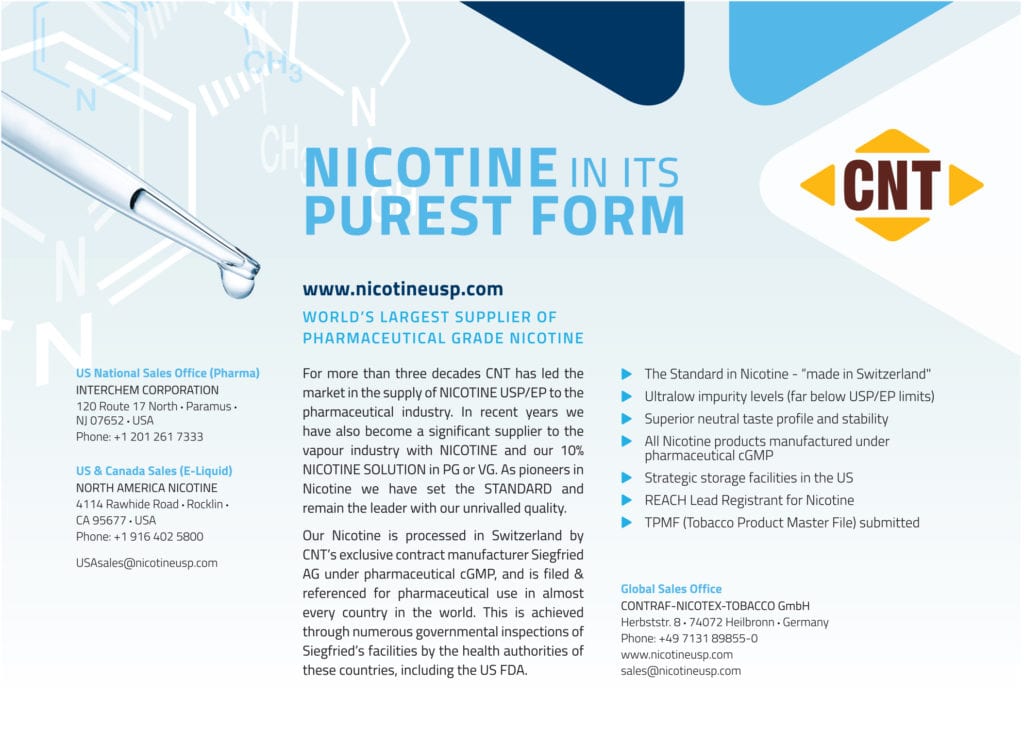Approaching Issues
- PMTA This Issue
- August 19, 2021
- 19 minutes read

Credit: Anthony Brown

The PMTA process has had some errors and challenges as the FDA’s decision deadline looms.
By Timothy S. Donahue
The U.S. Food and Drug Administration’s process for premarket tobacco product applications (PMTAs) has not been perfect. The regulatory agency has less than three weeks to complete its review of the more than 2 million PMTA submissions that remain of the more than 6 million received (the FDA refused to file more than 4 million submissions from the JD Nova Group). Given the unprecedented number of applications and other factors, the likelihood of the FDA reviewing all the applications by Sept. 9, 2021, is low.
“We will continue to allocate our resources with the goal of working as quickly as possible to transition the current marketplace for deemed products to one in which all products available for sale have undergone a careful, science-based review by [the] FDA,” an FDA spokesperson told Vapor Voice. “With that being said, as with all unauthorized products generally, if products are not authorized by Sept. 9, 2021, and do not come off the market at that time, they risk FDA enforcement.”
A court ruling requires the FDA to complete review of all submitted PMTAs by Sept. 9, 2021. Only a positive order issued by the FDA would allow a company to continue to be marketed according to the terms specified in the order letter.
“At a recent House hearing, acting FDA Commissioner Janet Woodcock pledged the FDA would make every effort to conclude review of the PMTAs from the top five vaping companies by the fall deadline,” said Gregory Conley, president of the American Vaping Association. “The FDA does not exactly have the best track record on keeping to their pledges, but it seems likely that decisions will be made on, at minimum, the tobacco and menthol varieties of Juul, Vuse, NJOY, etc., by September.”
Unfair warning
Complicating matters further, the regulatory agency has also recently been accused of issuing unwarranted warning letters, of leaving companies off its list of accepted PMTAs and of having technical issues with its PMTA filing software. As of July 26, the FDA had issued 135 warning letters for the marketing of illegal vaping products. The majority of those letters centered on e-liquids produced and sold online by small-sized vape shops. As the FDA continues its blitz, however, some companies who submitted PMTAs by the Sept. 9, 2020, deadline have allegedly received warning letters in error.
According to Facebook posts from the American Vaping Manufacturers Association (AVM), at least two companies have received warning letters for products for which they had submitted timely PMTAs. Posts acknowledged that the FDA corrected its mistake in a follow-up letter after receiving complaints from the companies. While the number may be small, it does suggest that the regulatory agency is overwhelmed by the number of submissions it is reviewing.

According to the FDA spokesperson, there has been only one instance where the regulatory agency removed a warning letter from its website after it was discovered that the company had submitted a timely PMTA. The agency did not mention the company by name and said the error had been corrected.
The FDA said the list may change as some companies may not have responded to requests or have not had their PMTA accepted yet. It should be noted that in its guidance document released in January 2020 that identified its enforcement priorities for electronic nicotine-delivery system (ENDS) products, the FDA stated that it “may prioritize enforcement of certain new deemed tobacco products that are marketed without market authorization, including as warranted based on changed circumstances, new information or to better address minors’ use of those products.”
The FDA also recently started listing closeout letters for companies that had responded to warning letters on its website. When the FDA completes an evaluation of corrective actions via a follow-up inspection, it may issue a closeout letter if the agency’s evaluation shows that the issues noted in the warning letter have been addressed.
Recently, however, the agency removed those letters from its website. The FDA offered no explanation for the removal of the closeout letters. Companies such as Dr. Crimmy’s V-Liquid, Bulldog Vapor and CC Apothacary had closeout letters posted, but then it seemed they were removed.
The FDA spokesperson said that the letters are still on the website; however, accessing them changed slightly. Users must now use the search functions to access response and closeout letters. “Any closeout letters issued to firms since Sept. 9, 2020, including Dr. Crimmy’s V-Liquid, Bulldog Vapor [and] CC Apothecary, are still posted on [the] FDA’s website,” the spokesperson said. “On [the] FDA’s ‘Warning Letters’ page, you can find the closeout letters by listing ‘Center for Tobacco Products’ under ‘Issuing Office’ and filtering for ‘Closeout Letter’ under ‘Letters with Response or Closeout.’”
The FDA often lists only a few illegal products in a warning letter. It then states that there may be more, but it is impossible to know if the warnings encompass all the company’s registered products. The agency states that it is the responsibility of the company to only sell products with a submitted PMTA.
Companies that receive warning letters from the FDA have to submit a written response to the letter within 15 working days from the date of receipt describing the company’s corrective actions, including the dates on which it discontinued the violative sale and/or distribution of the products. The response must also detail the company’s plan for maintaining compliance with the Food, Drug and Cosmetic (FD&C) Act in the future.
Warning letters are expected to continue to be issued for illegal vapor products as the deadline for FDA action moves closer, and their volume is likely to pick up after the Sept. 9 deadline. The FDA has not said if it intends to ask for an extension on the deadline; however, the U.S. Small Business Administration recently sent a letter to the FDA asking the regulatory agency to request an extension.
Making the list
There are other issues with the FDA PMTA process as well. Recently, the FDA released a list of products that are legal for sale in the U.S. As of Aug. 9, 372 companies had submitted PMTAs for more than 6 million products. Of those products, 99.9 percent are standalone e-liquid products—and of those, 80 percent of the e-liquid submissions were from a single company, according to ECigIntelligence, a vapor industry data and research firm.
At least five companies that filed PMTAs were allegedly erroneously left off the list, according to social media posts by an AVM representative. In its own investigation, Vapor Voice found that Humble Juice Co. had submitted a timely PMTA, received an acceptance letter and was subsequently left off the FDA’s list of approved products. The FDA has corrected the error for Humble. The AVM did not name what companies were left off the list or had falsely received warning letters.
The FDA stressed it has not independently verified the information provided by applicants about the marketing status of their products. In addition, the list excludes entries of products from companies that did not provide information on the current marketing status of their products to the FDA so that the agency could determine whether the existence of the application could be disclosed. It is possible companies were left off the list because they did not respond to the FDA before publication of the list.
As stated on the FDA’s website, the lists are not comprehensive or intended to cover all currently marketed deemed tobacco products that a company generally might manufacture, distribute or sell without risking FDA enforcement. The FDA stated that it was making the list available to the public to be transparent and increase stakeholder knowledge of these products. However, the list is only one source of information, and retailers should discuss with their suppliers the current status of any particular tobacco product’s application and marketing authorization, according to the FDA.
“Due to the large volume of information that needed to be processed to generate the list, it is likely that some information may have been inadvertently excluded during the development of the list. After initial posting of the list, FDA has received inquiries from companies about certain products they believe should have been included on the public list,” the spokesperson said. “We are reviewing these requests, and will update the list, if appropriate, to ensure accuracy. In general, due to the large amount of data in the files, FDA has also stated minor edits and corrections may be made to the list files to ensure accuracy, and the files will also be updated to reflect actions taken on the applications for the products.”
Shaky submissions
The PMTA submission process has also suffered from technical problems. Several companies have complained that the FDA’s software that manufacturers must download to submit PMTA data has randomly left out some files that the companies are uploading. At least two companies that have helped prepare more than 500 PMTAs have acknowledged the issue and have presented the problem to the FDA.
“We did 15 PMTAs for various clients and just all of a sudden had somebody come up and they got a deficiency letter asking for information that was included in their submission. We started looking through it, and it’s missing. We then spent a bunch of time going through every single one and found several others that were missing one or two files,” one of the companies that discovered errors told Vapor Voice. “We reached out to the FDA, got a basic response … ‘we’re aware of this; we’ll get back to you’ type of thing. We believe it’s a bug in the agency’s eSubmitter program.”
The FDA spokesperson said that the agency’s Center for Tobacco Products (CTP) submitters have three options for electronic submissions:
1. FDA hosts the Electronic Submission Gateway (ESG) used by all FDA centers for the past 20-plus years. It requires registration and maintaining a security certificate, which has an associated fee. CTP receives electronic submissions directly through the ESG from a small number of companies.
2. CTP provides a simpler zero-cost alternative to using the ESG directly with the FDA eSubmitter software and the CTP Portal. Using the CTP Portal requires obtaining a free account and using the FDA eSubmitter tool to create a valid package of files, which the CTP Portal will upload. Submitters must download the FDA’s eSubmitter software if they intend to use the free CTP Portal. Instructions for use are on the FDA webpage, and detailed technical specifications for creating valid eSubmitter packages can be found under Electronic Submission File Format and Technical Specifications.
3. Electronic files can be mailed to CTP Document Control Center (DCC) on physical media such as CD, DVD or flash drive.

The eSubmitter errors that some companies have found may be user error, according to the FDA. The inclusion of invalid file types in the upload package may make it appear as if certain files were left off. A common invalid file type users attempt to include are zero-sized files, according to the FDA.
“A user may unintentionally include *.tmp files, which are temporary files of zero size that the user’s computer creates when it is moving files from one location to another. If a user moves files they are uploading during the loading process, the .tmp file their computer created will become part of the package manifest and appear in the eSubmitter file count,” the spokesperson said. “A user may think they are sending 500 application files, but if one is a .tmp file, they are only sending 499 files related to the application.”
The CTP eSubmissions help desk recommends submitters create a file list and review the file types to be used in the submission against the list of invalid file types. After uploading to the CTP Portal, they can compare the list of valid files against the CTP Portal upload manifest to ensure all files were included. If files were found to not be included, they could be submitted separately, according to the FDA.
“In general, FDA intends to send only one deficiency letter (if appropriate),” the spokesperson said. “It is the applicant’s responsibility to ensure all information has been submitted to FDA and to review all files that were uploaded to the software prior to submission to FDA.”
Because of these issues, some companies are offering free PMTA deficiency reviews for companies that submitted them to the FDA. Delphinus Consulting and Blackbriar Regulatory Services have said they have programs to help companies find faults in their PMTA submissions.
After the deadline
How the vaping industry changes on Sept. 9 remains to be seen. Large companies may soon dominate the U.S. vapor market while e-cigarettes produced by smaller companies may disappear, according to new research by ECigIntelligence. The data firm carried out an assessment of the FDA’s “accepted” list in order to understand how the U.S. market may change in a post-PMTA regulated market.
Analysis of PMTAs shows that more applications for simpler disposables and cigalike devices were submitted than applications for open systems. According to the research, the simpler products usually come from large companies while the open systems usually come from smaller businesses. Only about 30 open system brands have filed PMTAs, implying that 85 percent of open system brands will be removed from the market, even if all 30 filed PMTAs are approved.
“This may indicate the discouragement nontobacco companies face when applying for PMTA approval,” said ECigIntelligence’s managing director, Tim Phillips. “The PMTA process can be a grueling one for nontobacco companies without sufficient financial means or knowhow. And if smaller brands are to become less prevalent in this category, consumers may soon only have the option of a few models provided by a handful of big companies.”
While the industry awaits decisions from the FDA, vape sales are rising. IRI data for U.S. convenience stores shows that dollar and unit sales for electronic smoking devices each climbed approximately 14 percent for the four weeks ending June 13. A 12-week review revealed a gain of 16.3 percent in dollar sales and 18.6 percent in unit sales.
Whether these trends will continue after Sept. 9 is anyone’s guess.
